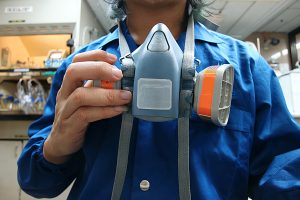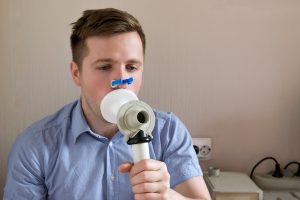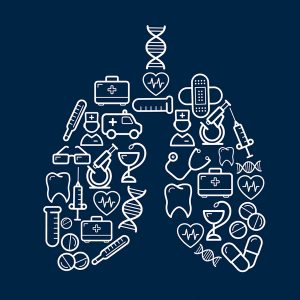Breathe Easy: Understand the Importance of Respiratory Protection at GIW
 At GIW Industries Inc., we take safety very seriously, and respiratory safety is one key part of our safety program. While not all GIW employees wear respirators to protect their airways at work, it’s important everyone is familiar with these precautionary devices. Learn from GIW Occupational Health Nurse Katja King how you and your fellow GIW employees can stay safe and breathe easy!
At GIW Industries Inc., we take safety very seriously, and respiratory safety is one key part of our safety program. While not all GIW employees wear respirators to protect their airways at work, it’s important everyone is familiar with these precautionary devices. Learn from GIW Occupational Health Nurse Katja King how you and your fellow GIW employees can stay safe and breathe easy!
Respirators required!
“We have two departments that are required to wear respirators due to hazards: our cleaning department, where they grind metal off the pumps, and in our paint department as well, where they’re coating the pumps,” Nurse King said.
Although the GIW respiratory standards policy confirms “no immediately dangerous to life and health (IDLH) conditions exist in any GIW facility” and there is no immediate danger to those breathing in GIW facilities, it’s important to protect employees against any potential long-term hazards. That means proper protection for all who are required to wear respirators.
“We provide a variety of different respirators to our employees to accommodate their individual needs,” Nurse King said. “The types of respirators used include positive pressure hoods, powered air purifying respirators (PAPRs), full-face respirators, half masks, and N95 dust masks. Generally, employees can comfortably wear the half-face-mask respirators. Sometimes we have employees who wear glasses, so the full-face respirators are a better option so that the respirator does not interfere with their glasses. We also have the PAPRs, which can be utilized by employees who may not have the ability to wear the regular respirators. We want to ensure that each employee is wearing the respirator best suited to their individual needs, and this affords us the option to do so.”
And for good reason.
“We definitely stress it because what we do have is very harmful. It causes a lot of chronic effects on health, and that’s what we absolutely don’t want,” Nurse King said. “We want to try to, of course, keep our employees as healthy as possible and limit those risks. We have so many other environmental factors that can cause health issues chronically, especially respiratory, because we’re breathing in everything in the environment. Anything we can do to lessen hazards is really important here.”
Respirator safety program
 Because of the emphasis GIW leaders put on it, the respirator safety program starts from the beginning with new GIW employees and temporary employees, too.
Because of the emphasis GIW leaders put on it, the respirator safety program starts from the beginning with new GIW employees and temporary employees, too.
“When we have employees who start here, we do the pulmonary function testing. That’s some testing they get done on their lungs prior to wearing the respirator to make sure their lungs can handle wearing the respirator. After that we do the respirator fit test, which I do here in my office, to make sure there’s a complete seal around the employee’s nose and mouth,” Nurse King said. “We do that with every single employee who wears a respirator so we make sure that everybody who’s at risk for inhaling those hazards is protected. We don’t want any chronic conditions originating from the work environment here, and another part of that is doing chest X-rays every two years so we can keep an eye out. If we do detect any early changes from those hazards, we can address those right away and get those taken care of before they get to an advanced stage and they’re terminal conditions. It’s a very low likelihood, but we want to prevent that, so we make sure we stay on top of it with the respiratory program.”
When measuring the respirator safety program, no negative respiratory results are a good sign.
“We have no record that I’m aware of on the safety side of any employee or situation where we’ve had an issue related to their respiratory hazards and had to address it,” Nurse King said. “The program is pretty successful, and we’re going to continually try to improve that program and make it as robust as possible. We haven’t had any major issues, which is awesome because it’s very hazardous out there.”
Education is key
 Nurse King plays an important role in helping keep that safety record strong.
Nurse King plays an important role in helping keep that safety record strong.
“I always educate the employees whenever I do their fit tests on the use of it and their filters that they use and how long they’re good before they’re expired, how to clean it, things like that,” Nurse King said. “The better upkeep on the respirator, the more effective it’s going to be and the better it’s going to work.”
For those with concerns, Nurse King is always available to help.
“A lot of times I’ll have people come into my office, and we have a lot of seasonal issues going on with the weather changes. I always ask them to keep an eye out if they’re starting to cough or if they’re noticing any patterns while they’re at work with coughing up any mucus,” Nurse King said. “A lot of times, they’ll inhale dust out here, so even the employees who don’t wear respirators will come to me and they’ll tell me they’re coughing up black dust and blowing their nose and it’s got black stuff in it. It’s a lot of awareness and addressing it early before it becomes a problem: keeping good general health but also staying hydrated because that has a lot to do with it.”
If you think you may be experiencing an issue — if you can start smelling or feel you’re inhaling chemicals, if you drop your respirator, or if the silicone portion tears — go to your supervisor as soon as possible and then to Nurse King. Members of the safety team are also well-versed in respiratory safety and willing to answer questions or assist with issues.
“For the employees who do use them, be diligent about wearing respirators,” King said.
Do you have a health-related question or concern? Contact GIW Occupational Health Nurse Katja King at katja.king@ksb.com or 706-434-0725.

